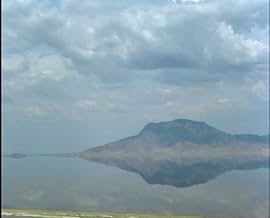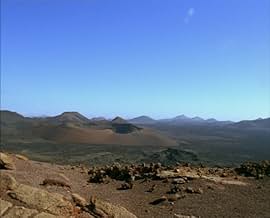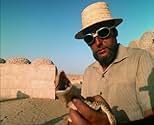IMDb RATING
6.7/10
4.3K
YOUR RATING
Footage shot in and around the Algerian Sahara Desert, accompanied only by a spoken creation myth and the songs of Leonard Cohen.Footage shot in and around the Algerian Sahara Desert, accompanied only by a spoken creation myth and the songs of Leonard Cohen.Footage shot in and around the Algerian Sahara Desert, accompanied only by a spoken creation myth and the songs of Leonard Cohen.
- Director
- Writer
- All cast & crew
- Production, box office & more at IMDbPro
Featured reviews
I find Herzog's documentary work to be very uneven. Fata Morgana, a companion piece of sorts to Lessons of Darkness, lacks not only the harrowing spectacle but mostly the discerning eye of an author. It is by comparison amateur looking, aimless pans left and right across the desert the kind of which you would expect from any German tourist equipped with a handycam, the camera left running from the window of a car picking up all kinds of meaningless images, wire fences, derelict buildings and patches of dirt going through the lens in haphazard order, intercut with shots of sand dunes. At one point Herzog encounters a group of starved cattle rotting away in the sand, yet the image is presented much like you and me would, perhaps worse, the camera peering hand-held from one cattle to the next. For a documentary that attempts to be a visual feast, a hypnotic, surreal excursion in uncharted landscapes, it lacks the visual orchestration and conviction of a disciplined author. It's all over the place, half-hearted and tedious, Mayan creation myths recited in voice-over, then some other text Herzog fancied for literature. It's not until near the end that Fata Morgana jumps alive through a series of bizarre encounters. First with a man and a woman playing music in a room, the man singing in a distorted voice through a mic, both of them apathetic in their task. A man holding up a turtle. A group of old people trying to get out of some holes in the ground. Other than that, this one seems to have very little of substance to offer or visual splendor to offer.
10D Kieckh
Successful films on metaphysical subjects are rare, but Fata Morgana is a good case. You can chalk up the large subject to the ambitions of youth, but Herzog does an amazingly good job. The movie's point is to show human beings, and even the world, from a non-human point of view.
The movie is in three parts: Creation, Paradise, and The Golden Age. The imagery of each is in counterpoint to the voice-over. Although the text of `The Creation' (from the Popol Vuh, a Mayan myth) refers to the primordial wasteland, the scene goes no further in illustrating the myth. It dwells on the waste, and on various specimens of destruction (fire, smoke, wrecked vehicles). The images from `Paradise' are anything but that, and `The Golden Age' is darkly comic the highest culture is the strange roadside musical act.
The Popol Vuh suggests that mankind is the central object of creation, but the movie does everything it can to undo this notion. Its mythological framework has no referent in human historical time. There are no human characters to speak of. When a boy stands with a dog in an extended shot, the initial suggestion is of the boy's point of view; by the end it is much more the dog's. Likewise the lizard is a stronger character than the human who introduces it, and the turtle's partner barely looks human with his big flippers.
Animal stories and nature documentaries always anthropomorphize, but Fata Morgana has none of that. Certainly the dunes look like a female body, but the simile cuts both ways. Presumably only humans can distinguish easily between their creation and nature, and here airplanes and factories are presented alongside mountains, lakes, and waterfalls. People and civilization are all part of a broader natural landscape.
In 1979 Herzog put a new twist on the idea when he remade Nosferatu from the vampire's point of view.
The movie is in three parts: Creation, Paradise, and The Golden Age. The imagery of each is in counterpoint to the voice-over. Although the text of `The Creation' (from the Popol Vuh, a Mayan myth) refers to the primordial wasteland, the scene goes no further in illustrating the myth. It dwells on the waste, and on various specimens of destruction (fire, smoke, wrecked vehicles). The images from `Paradise' are anything but that, and `The Golden Age' is darkly comic the highest culture is the strange roadside musical act.
The Popol Vuh suggests that mankind is the central object of creation, but the movie does everything it can to undo this notion. Its mythological framework has no referent in human historical time. There are no human characters to speak of. When a boy stands with a dog in an extended shot, the initial suggestion is of the boy's point of view; by the end it is much more the dog's. Likewise the lizard is a stronger character than the human who introduces it, and the turtle's partner barely looks human with his big flippers.
Animal stories and nature documentaries always anthropomorphize, but Fata Morgana has none of that. Certainly the dunes look like a female body, but the simile cuts both ways. Presumably only humans can distinguish easily between their creation and nature, and here airplanes and factories are presented alongside mountains, lakes, and waterfalls. People and civilization are all part of a broader natural landscape.
In 1979 Herzog put a new twist on the idea when he remade Nosferatu from the vampire's point of view.
Fata Morgana is an absolute masterpiece. It's Werner Herzog's most unconventional film. It doesn't have a plot or story. Instead of a story, we're given a collection of images, words and music that work so wonderfully together. It's not a documentary either. Some of the people in this film are directed and given lines to read. It has some of the most beautiful and haunting images. Herzog shoots real mirages and we see cars and people floating around in the middle of the desert who aren't actually there but hundreds of miles away reflected like in a mirror. The use of music in this movie is so brilliant - from Leonard Cohen, Mozart, and the Third Ear Band. Imagine Stanley Kubrick's 2001: A Space Odyssey in the desert; that's what this movie is like. This film is so hypnotic that it has the ability to make you feel as though your spirit has left your body. A must see. It will change the way you view films. Rating: 10 out of 10.
Fata Morgana is, by far, one of the weirdest and most perplexing art films I have ever seen. I hesitate to call it a documentary because, while is does have elements of documentation of it's images, the images themselves are so unusual, so hallucinogenic, so unclear, that I wonder whether it was really worth telling this story just so that these images can exist. The film basically is the tale of the earth and the creation of the earth shot from the perspective of an outsider, be it alien or something otherwise indescribable, all taking place in the Sahara desert. The title of the picture relates to the illusion or reflection of images, both real and hallucinated, that people in the desert often witness. These are also known as mirages.
The film opens with a plane landing followed by the plane landing again and then again and again and again and again and again and again. With each plane landing shot, the actual architecture of both the location it is landing at and the plane itself begin to slowly dissolve into one another and grow less and less real and more and more reflective imagery. The imagery in this film only grows more intense and more unusual as the picture continues. The narration of the film tells of the creation of the universe as alarming sexual images of sand and landscape move past the camera. The shots go further and further into the desert and Herzog films whatever he sees and finds. The strangest reflections of the world are on display in the distance while Herzog meets some of the most pure and photogenic collections of outsiders that you are ever likely to see. When the Leonard Cohen soundtrack kicks in, you can be sure that you are in the world of a mad man who is in love with the universe.
I cannot say too much more about this film without ruining anything, but I will say that it is a sobering experience and there's really nothing like it. I love seeing films that are just in classes of their own. This film certainly is a good example of how Herzog loves to intermingle narrative storytelling and documentary film-making into an interchangeable form. Fata Morgana unfortunately does overstay it's welcome just a bit, but by the time it nears it's end the images will most likely be burned into your mind forever. Definitely a must-see for those who are obsessed with the nature and the origin of the universe.
The film opens with a plane landing followed by the plane landing again and then again and again and again and again and again and again. With each plane landing shot, the actual architecture of both the location it is landing at and the plane itself begin to slowly dissolve into one another and grow less and less real and more and more reflective imagery. The imagery in this film only grows more intense and more unusual as the picture continues. The narration of the film tells of the creation of the universe as alarming sexual images of sand and landscape move past the camera. The shots go further and further into the desert and Herzog films whatever he sees and finds. The strangest reflections of the world are on display in the distance while Herzog meets some of the most pure and photogenic collections of outsiders that you are ever likely to see. When the Leonard Cohen soundtrack kicks in, you can be sure that you are in the world of a mad man who is in love with the universe.
I cannot say too much more about this film without ruining anything, but I will say that it is a sobering experience and there's really nothing like it. I love seeing films that are just in classes of their own. This film certainly is a good example of how Herzog loves to intermingle narrative storytelling and documentary film-making into an interchangeable form. Fata Morgana unfortunately does overstay it's welcome just a bit, but by the time it nears it's end the images will most likely be burned into your mind forever. Definitely a must-see for those who are obsessed with the nature and the origin of the universe.
10nienhuis
You will be able to tell within the first 30 seconds of this film whether you want to finish watching it. The film opens with images of planes landing at an airport, one plane after another diving into a mirage-filled runway. You will be able to accurately guess that this movie is not about a "story." At first viewing, it's even easy to think the opening images are repetitive shots of the same plane. The initial drama is in the acuteness of your perception, which is built on your willingness to experience the film simply as a series of images. If after this opening, you want to see the movie, you will not be bored. You may even be mesmerized. The movie may be an emotional experience; it may be an intellectual experience; it may be both. Judging from the DVD commentary, which is essential, it was primarily an emotional experience for Herzog, and, at one point, he talks explicitly about how the film is a collaboration between filmmaker and viewer. There's plenty of room for the viewer to make of this film exactly what he or she wants to make of it. Take a gamble?
Did you know
- TriviaOne of two films from 1971 to feature a trio of songs by Leonard Cohen, the other being Robert Altman's McCabe and Mrs. Miller.
- ConnectionsFeatured in I Am My Films (1978)
- SoundtracksHey, That's No Way to Say Goodbye
Written and Performed by Leonard Cohen
- How long is Fata Morgana?Powered by Alexa
Details
Contribute to this page
Suggest an edit or add missing content























